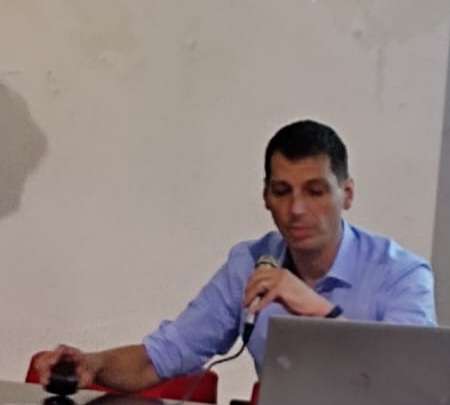Studying at the University of Verona
Here you can find information on the organisational aspects of the Programme, lecture timetables, learning activities and useful contact details for your time at the University, from enrolment to graduation.
Academic calendar
The academic calendar shows the deadlines and scheduled events that are relevant to students, teaching and technical-administrative staff of the University. Public holidays and University closures are also indicated. The academic year normally begins on 1 October each year and ends on 30 September of the following year.
Course calendar
The Academic Calendar sets out the degree programme lecture and exam timetables, as well as the relevant university closure dates..
| Period | From | To |
|---|---|---|
| Primo semestre QPA | Oct 2, 2023 | Dec 22, 2023 |
| Secondo semestre QPA | Feb 26, 2024 | May 31, 2024 |
| Session | From | To |
|---|---|---|
| Sessione invernale QPA | Jan 8, 2024 | Feb 23, 2024 |
| Sessione estiva QPA | Jun 3, 2024 | Aug 10, 2024 |
| Sessione autunnale QPA | Sep 2, 2024 | Sep 27, 2024 |
| Period | From | To |
|---|---|---|
| Festa di Ognissanti | Nov 1, 2023 | Nov 1, 2023 |
| Festa dell'Immacolata | Dec 8, 2023 | Dec 8, 2023 |
| Vacanze di Natale | Dec 24, 2023 | Jan 7, 2024 |
Exam calendar
Exam dates and rounds are managed by the relevant Culture and Civilisation Teaching and Student Services Unit.
To view all the exam sessions available, please use the Exam dashboard on ESSE3.
If you forgot your login details or have problems logging in, please contact the relevant IT HelpDesk, or check the login details recovery web page.
Should you have any doubts or questions, please check the Enrollment FAQs
Academic staff
 riccardo.bertolazzi@univr.it
riccardo.bertolazzi@univr.it
Study Plan
The Study Plan includes all modules, teaching and learning activities that each student will need to undertake during their time at the University.
Please select your Study Plan based on your enrollment year.
1° Year
| Modules | Credits | TAF | SSD |
|---|
3 modules among the following2 modules among the following2° Year It will be activated in the A.Y. 2024/2025
| Modules | Credits | TAF | SSD |
|---|
2 modules among the following| Modules | Credits | TAF | SSD |
|---|
3 modules among the following2 modules among the following| Modules | Credits | TAF | SSD |
|---|
2 modules among the followingLegend | Type of training activity (TTA)
TAF (Type of Educational Activity) All courses and activities are classified into different types of educational activities, indicated by a letter.
History of Greek and Roman Art (2023/2024)
Teaching code
4S003290
Teacher
Coordinator
Credits
6
Language
Italian
Scientific Disciplinary Sector (SSD)
L-ANT/07 - CLASSICAL ARCHAEOLOGY
Period
Secondo semestre QPA dal Feb 26, 2024 al May 31, 2024.
Courses Single
Authorized
Prerequisites and basic notions
No prerequisites are needed, but it is preferable to have at least general informations about Greek and Roman history
Program
The course offers a focused study of the funeral contexts and funeral monuments in Greek and Roman times.
- In the first part we address the study of Greek and Roman funeral contexts and funeral monuments by means of the integrated analysis of various types of source (literary, epigraphic, archaeological and historico-artistic). Topics highlighted include the architectural aspects of the funeral monuments, their decoration, their inscriptions, the location of the necropolis in the city, the grave goods, the rites etc. In the second part we address the study of anthropological, paleobotanical, chemical etc. analyses of the funeral contexts. In the third part we’ll analyze some exemples of funeral contexts in Gallia Cisalpina (with oral presentations by the students) and we’ll visit some sites and monuments.
Didactic methods
The first part of the course will consist of lectures while the second will consist of seminars and the educational trips to be agreed upon at the beginning of the course.
Lectures will be broadcast via videoconferencing. Further, the lecture PowerPoints will be made available to students by way of the online teaching.
The material provided by the teacher (lecture PowerPoints) should be combined with study of a text chosen from amongst those that will be presented in class and listed on the first slide of each lecture.
Learning assessment procedures
The exam will be oral. However, before the oral exam, students must prepare a written essay on a necropolis / funerary context of their choice, to be sent to the teacher at least one week before the exam itself. The paper must have a length of 10-12 pages of 2000 characters each, including notes, bibliography and images. The oral exam will focus on the discussion of this essay and on some questions on the general part.
Evaluation criteria
The exam aims to verify the level of achievement of the educational objectives indicated above, the ability to analyze and synthesize, the ability to present both written and oral, through the use of specific terminology. T
Criteria for the composition of the final grade
he questions on the general part will be worth 40% of the final grade, the written essay and its discussion will be worth 60% of the final grade.
Exam language
italiano
Type D and Type F activities
SOFT SKILLS
Find out more about the Soft Skills courses for Univr students provided by the University's Teaching and Learning Centre: https://talc.univr.it/it/competenze-trasversali
CONTAMINATION LAB
The Contamination Lab Verona (CLab Verona) is an experiential course with modules on innovation and enterprise culture that offers the opportunity to work in teams with students from all areas to solve challenges set by companies and organisations.
Upon completion of a CLab, students will be entitled to receive 6 CFU (D- or F-type credits).
Find out more: https://www.univr.it/clabverona
PLEASE NOTE: In order to be admitted to any teaching activities, including those of your choice, you must be enrolled in the academic year in which the activities in question are offered. Students who are about to graduate in the December and April sessions are therefore advised NOT to undertake extracurricular activities in the new academic year in which they are not enrolled, as these graduation sessions are valid for students enrolled in the previous academic year. Therefore, students who undertake an activity in an academic year in which they are not enrolled will not be granted CFU credits.
Modules not yet included
Career prospects
Module/Programme news
News for students
There you will find information, resources and services useful during your time at the University (Student’s exam record, your study plan on ESSE3, Distance Learning courses, university email account, office forms, administrative procedures, etc.). You can log into MyUnivr with your GIA login details: only in this way will you be able to receive notification of all the notices from your teachers and your secretariat via email and soon also via the Univr app.
Graduation
Linguistic training CLA
Doppio Titolo
Il doppio titolo è un programma integrato di studio attivato a seguito di una convenzione fra l’Ateneo di Ferrara e una Università straniera.Nell'ambito del corso di laurea magistrale in Quaternario, preistoria e archeologia è attivo un progetto di doppio titolo erogato in partnership con il Master “Mention Archéologie, sciences pour l’archéologie parcours Arts, Sociétés, Environnements de la Préhistoire et de la Protohistoire: Europe, Afrique” dell’Université de Toulouse Jean Jaurès (Francia)
Gli interessati potranno candidarsi al progetto come previsto dal bando di selezione.
Per ulteriori informazioni si rimanda al bando di ammissione del doppio titolo:
http://www.unife.it/interfacolta/lm.preistoria/doppio-titolo

 +39 045802 8638
+39 045802 8638


